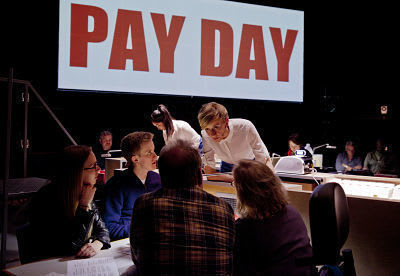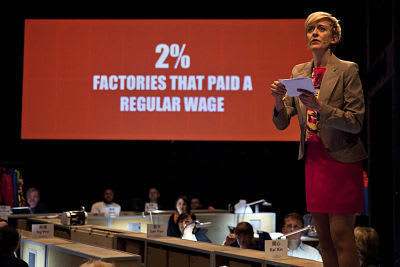Young Vic’s Maria is transformed almost into a factory as the audience is seated around tables of five or six under the neon light of desk lamps. It is an impressive sight as the four actors (Naomi Christie, Lucy Ellison, Heather Lai, Jamie Martin) walk around the tables on platforms that interconnect the zigzag structure of the set.
After 3 years of research, Metis under the direction of Zoë Svensden and Simon Daw bring the audience into a journey of investigation, literally and practically. The focus is China, the clothing industry and industrial revolution Britain.
The questions are clear: what do we know about mass production? About China? About ourselves and how we shop and consume the world? The links between Britain and China are easily done at the beginning through the stories in parallel told by a northern former factory worker and a Chinese factory manager’s daughter.
British declining manufacturing industry and Thatcher’s aggressive capitalism become the backdrop for Chinese mass-production. The rest is left mostly to the audience, who, in a sort of board-game cleverly facilitated by the four actors, can experience what is like to make decisions and can choose between saving the workers and making profit.
The cultural pointers and the scenarios in this experiential and participatory theatrical investigation ring true and articulate well the problems and the nuances of a situation that is neither black or white. It is all about survival and the stakes are high and the demands are difficult to meet.
When you discover at the end of the game how well your team has done, you come to the realisation that perhaps competitiveness and economic rationales are strong drives. Where there are no regulations protecting the workforce, it is easy enough to ignore the good for the bad.
The sophistication of the experience and the dynamics of the game make the production much more than a piece of interactive participatory theatre. It is a unique experience where the drama is created by the audience in their own groups and where good old social interactions are initiated whilst sudden and difficult decisions are taken.
Much credit must be given to the two creators that have thought hard on how best to present the matters at hand and most importantly on how to use the research material they meticulously collected in their frequent visits to China.
This is not another patronising, documentary-like representation of China. Very different in content and scope from The World of Extreme Happiness that only highlighted the wrong-doings of a country that is by far more complex than we in the West can comprehend. It is not merely didactic and shock-provoking. World Factory is an all-inclusive, enjoyable, intelligent production pointing to the ‘dramas’ of our society.
It puts us, the ‘common’ people, in the spotlight as we start to think about our choices and the choices of those who govern us. We are, also, reminded that Britain has its own role in all this: we discover, and not surprisingly, that wages have only gone up 16% in the last decade, which makes this country a perfect candidate for cheap production.
Metis are changing the theatrical landscape with their work of political experiential theatre and for those sceptics of interactive theatre a piece of warning and a strong recommendation: this is not what you think, it is much better and by far more fun.


